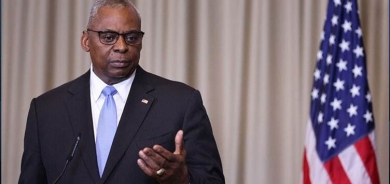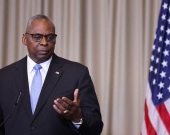‘Free in speech but imprisoned when moving’: A look at writers facing death threats

The attack on Salman Rushdie in New York state on August 12 highlights the plight of other writers threatened with death, who are forced to live every moment in a state of fear.
The attack on Rushdie was all the more distressing for supporters of his right to free expression as Rushdie had lived freely in New York for years – thinking he was free – after the Iranian government said in 1998 that it would “neither support nor hinder” assassination attempts on Rushdie, as a precondition to normalise diplomatic relations with the UK.
The British police and MI5 had protected Rushdie in a string of safehouses for nine years, ever since the declaration of the Iranian fatwa on February 14, 1989 because his novel The Satanic Verses was deemed offensive to Islam.
FRANCE 24 takes a look at several other writers facing death threats.
Roberto Saviano
The Italian writer Roberto Saviano has described himself as “free in his speech but imprisoned when moving”. His journalistic narrative Gomorra – a harrowing expose of the Neapolitan Mafia the Comorra – sold more than four million copies around the world. Praised by critics for its exposure of the criminal underworld in novelistic style, Gomorra also prompted the mob’s vow of revenge against Saviano.
The Neapolitan writer has been forced to live under constant police protection since October 13, 2006. The title of his 2021 graphic novel, I’m Still Alive, says it all. Saviano sees his writing as a form of “resistance”, trapped in a liminal situation where he is still alive but unable to live his life like a normal person.
Saviano has continued to write – his most recent book, the novel Savage Kiss, came out in 2020. He is also regularly in the media spotlight for his pithy analyses of Italy’s turbulent politics. And Saviano is – unsurprisingly – an uncompromising supporter of Rushdie’s right to live and write in freedom.
Zineb El Rhazoui
Zineb El Rhazoui sees her life as a “walking prison”. A writer and journalist for Charlie Hebdo, she escaped the terrorist attack on the satirical magazine’s office that killed seven people on January 7, 2015 because she happened to be in Casablanca at the time. Since then, the Franco-Moroccan writer has had to live under constant police protection. “This kind of threat has turned our lives, the lives of our children and families, upside down,” El Rhazoui told Le Parisien in 2019.
Like Saviano, she refuses to be silent. El Rhazoui first captured the attention of the French public in 2011 when she founded the association Ni Putes ni Soumises (“Not Whores, Not Submissive”). El Rhazoui was ousted by Charlie Hebdo for criticising the magazine’s financial management in 2016, but has continued to make outspoken comments in the media.
Then in 2019, El Rhazoui said on TV channel CNews that the police should use “live ammunition” on rioters in France’s troubled suburbs.
The same year, she triggered a new wave of criticism for posing alongside a far-right YouTuber. The death threats mounted. “I’m living like a shut-in,” she said on TV station TF1 in August. “All of my outings have to be organised in advance. I can’t take public transport. Naturally, people are worried about my privacy and my freedom.”
El Rhazoui has also been a fervent defender of Rushdie. “Read and re-read #SatanicVerses by #SalmanRushdie, one of the greatest British writers of his generation. Let everyone buy his book; let it be on every bookshelf in every home. Let the immortality of this novel be the consequence of Islamic hatred.”
Orhan Pamuk
“Over the past 20 years, I’ve had long conversations with writers who have received death threats, especially from Islamists or Islamic extremists. Well I’m also one of them,” Pamuk confided to French magazine Le Point in 2006 – the same year the Turkish novelist became one of the youngest writers to be honoured with the Nobel Prize for Literature.
Pamuk now has to live with a continuous security presence. “No matter how nice the bodyguards are or how hard they try to stay out of sight, it’s not a pleasant experience,” he said.
Pamuk is considered one of the greatest novelists of his age, building on an array of Western influences to capture the soul of transcontinental Turkey and indeed the universal human condition – from his early family chronicle Cedvet Bey and His Sons to medieval tale My Name Is Red to political thriller Snow.
But Pamuk is also one of the most threatened novelists in the world. A political freethinker, he refused the title of “state artist” in 1998, during the last embers of the long Kemalist epoch. Since then, Pamuk has denounced in the press Turkey’s lurch into Islamism under President Recep Tayyip Erdogan. He was also the first prominent writer in a Muslim-majority country to speak out against the fatwa targeting Rushdie.
Pamuk also received a torrent of vitriol – including death threats and a summons to the courts – for daring to acknowledge in 2005 Turkey’s responsibility for the Armenian genocide and massacres of the Kurdish minority. The Ergenekon network – a nexus of nationalist activists, army officers, police officers, magistrates, mafiosi, academics and journalists – has been accused of plotting his assassination.
Pamuk reportedly fled to the US in 2007 to escape threats to his life.
Kakwenza Rukirabashaija
After his third arrest – when he was tortured – Rukirabashaija finally decided to leave Uganda. A series of ferocious tweets mocking the son of President Yoweri Museveni triggered the authorities’ anger. Rukirabashaija had to walk across the border to Rwanda before he could seek refuge in Europe. “I’ve been diagnosed with damaged kidneys, bruised ribs and post-traumatic stress disorder,” he told AFP – adding that he felt unsafe throughout the African continent but feels safe in Germany.
Yet Rukirabashaija also said that exile is “difficult” because his wife and six children are still in Uganda and that Museveni’s son threatened to kill his relatives if he spoke out about his mistreatment.
Rukirabashaija was roughed up by the authorities on previous occasions, notably after the publication of his critically acclaimed first novel The Greedy Barbarian (2020), about an imaginary country plagued by corruption. He soon followed it up with 'Banana Republic: Where Writing is Treasonous' about his time in detention.
Rukirabashaija was awarded the PEN Pinter Award, specifically for persecuted writers. “If you torture a writer, he will bleed ink,” the novelist said upon reception of this prize, named after the great playwright Sir Harold Pinter.
Taslima Nasreen
Nasreen went through a similar experience to Rushdie. Islamic fundamentalists issued a fatwa against her in September 1993. Her crime? She had written a novel, called Laija (“Shame”), which portrayed in a negative light violence against the Hindu minority in Muslim-majority Bangladesh.
“I just learned that Salman Rushdie was attacked in New York. I am really shocked,” Nasreen tweeted upon the news of Rushdie’s stabbing. “I never thought it would happen. He has been living in the West, and he has been protected since 1989. If he is attacked, anyone who is critical of Islam can be attacked. I am worried.”
Nasreen had to flee her native Bangladesh and found refuge in India. However, after a conference she gave in 2007, an Islamist group offered a bounty of 500,000 rupees to anyone who could behead her. The same year, she fled Calcutta after violent demonstrations against her presence.
The strength of her work and the determination of her struggle won her numerous awards, including the Sakharov Prize in 1994 and the Simone de Beauvoir Prize in 2008. That same year, she became an honorary citizen of Paris, where she lived for some time.
While she feels free in Europe, Nasreen told Paris Match that she still sees South Asia as her writerly home: “I am a European citizen but I moved to India because women are more oppressed there, so I can take action; I can inform women of their rights and fight for them.”
France 24














